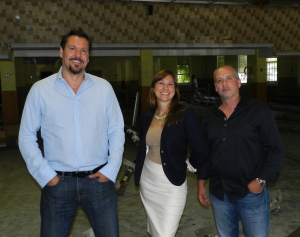Flipping for Plan B burgers
What”™s your favorite thing to cook? Tell us about the last party you hosted in your personal life. What languages do you speak?
For those seeking a position with Plan B Burger Bar, a small-but-growing burger chain owned by Hartford-based Locals 8 Restaurant Group, creativity scores bonus points.
Applicants selected to move onto the next step in the hiring process are presented with a whole new set of hoops to jump through. Literally.
Plan B Burger”™s unique twist on hiring, which includes participation in a series of field-day-like activities, means management has a deeper understanding of its future employees than the run-of-the-mill restaurant.

Being able to foster a strong culture among its employees ”” from line cooks to bartenders to hosts and hostesses ”” has been instrumental in Plan B Burger”™s growth, Locals 8 Restaurant Group co-founders Allie (Al) J. Gamble and Shawn M. Skehan say.
“Our employees ”” they are our business. Without them ”¦” Skehan said, trailing off.
By all accounts, that belief has been well founded.
Plan B Burger was named to Inc. magazine”™s annual 500/5000 list in 2010, 2011 and 2012. The chain, which was founded in 2006 and has restaurants in West Hartford, Glastonbury, Simsbury, Milford, Stamford and Springfield, Mass., ranked No. 370 on the most recent Inc. 500/5000 with revenue growth of more than 1,000 percent from 2008 to 2011.
Inc. magazine ranks Plan B Burger as the No. 1 hirer in Connecticut and the eighth-fastest growing company in the state.
The seventh Plan B Burger is scheduled to open at 1262 Post Road in Fairfield this fall, where the company will add between 80 and 85 workers to its current workforce of about 480. An eighth will open next spring in Washington, D.C., marking the chain”™s first foray outside New England.
Plan B Burger is not a quick-service restaurant or QSR, the co-founders emphasized. Gamble and Skehan got their start in the bar industry and started Plan B Burger as a burger bar specializing in organic, locally sourced products complemented by craft beer and craft bourbon.
“The plan was always to have a burger bar,” Gamble said. “The bar environment was important to us. That”™s how we fill a niche between fine dining and QSR.”
Lena DiGenti, director of brand strategy for Plan B Burger, said the key to the company”™s growth lies in its professional development successes.
It starts with the hiring process. DiGenti said the goal of the application questionnaire and field-day “audition” is to see candidates”™ problem-solving and people skills first hand.
“It”™s all about us being able to watch them demonstrate they can work as a team,” she said, adding that not only does it help Plan B Burger choose the best candidates, but it helps the candidates familiarize themselves with their future co-workers before they even start on the job.
Once on the job, employees are encouraged to explore other opportunities within the company. Gamble and Skehan said it”™s not uncommon for a busboy to work his way into the kitchen as chef, for a waitress to end up on the management side, or for one of the restaurant”™s beer offerings to have been developed by an employee.
“People, after working with us, realize it can be a profession, a career,” DiGenti said. “We”™re trying to shatter that myth that this is a dead-end, transient kind of job.”
Plan B Burger even offers professional development courses for their employees. Recently, a group of employees expressed an interest in a public speaking course, and management is now in the process of arranging a seminar, DiGenti said.
“I think you gain people skills that carry over to any industry,” said Skehan, who serves as president of Locals 8 Restaurant Group.
His business partner finished the thought: “There”™s a lot to learn here outside of just food and drinks,” said Gamble, CEO of the group. “We feel if we”™re going to ask someone to come and work 40 hours a week for us, we”™ve got to pay it forward.”
The company has no plans to franchise, with the co-founders saying they”™re only interested in expanding to towns where there is the right “connection.”
Gamble said the group is most interested in expanding to towns with a strong restaurant culture where it can build on the existing offerings. “What is important is that we can complement the offerings in a town and not cannibalize them,” he said.